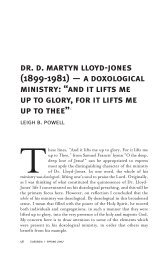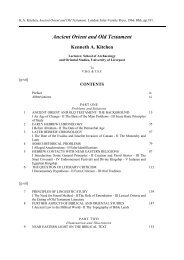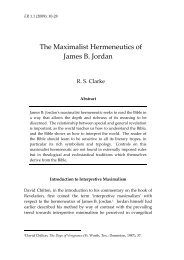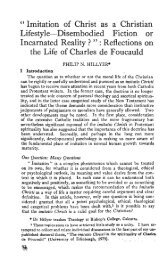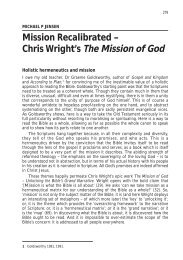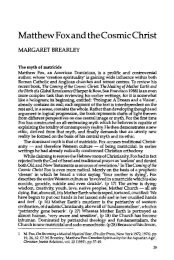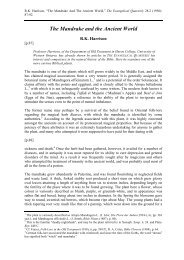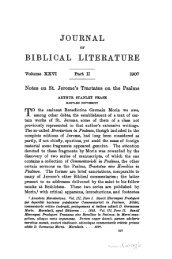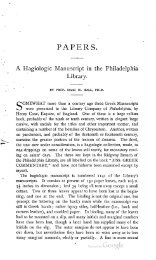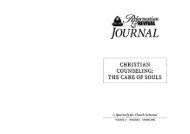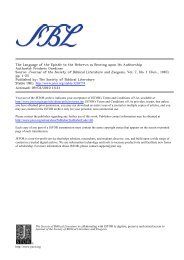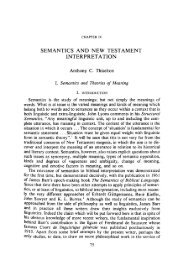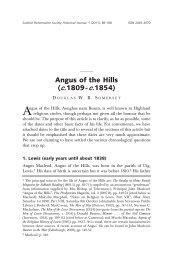Lutheranism in Russia and the Soviet Union: Another Response to ...
Lutheranism in Russia and the Soviet Union: Another Response to ...
Lutheranism in Russia and the Soviet Union: Another Response to ...
Create successful ePaper yourself
Turn your PDF publications into a flip-book with our unique Google optimized e-Paper software.
254 Gerd Stricker<br />
pas<strong>to</strong>rs (who had come <strong>to</strong> <strong>Russia</strong> straight from Wiirttemberg), <strong>and</strong> <strong>the</strong>se won <strong>the</strong> trust of<br />
<strong>the</strong> brethren communities, but <strong>the</strong> majority of pas<strong>to</strong>rs had been tra<strong>in</strong>ed <strong>in</strong> <strong>the</strong> <strong>the</strong>ological<br />
faculty at Dorpat with its high-church tradition, <strong>and</strong> more or less firmly rejected <strong>the</strong><br />
Pietists' pla<strong>in</strong> legalistic fundamentalism. In <strong>the</strong> 'brethren ga<strong>the</strong>r<strong>in</strong>gs' ('BriideJllersammlungen')<br />
which had replaced <strong>the</strong> 'Gebetsstunden' a simple table with a Bible on it sufficed<br />
(no c<strong>and</strong>les!) <strong>in</strong> a pla<strong>in</strong> prayer room; <strong>the</strong> 'born aga<strong>in</strong>' bro<strong>the</strong>rs <strong>and</strong> sisters, whose<br />
preachers were all laypeople, rejected everyth<strong>in</strong>g else.<br />
Thus <strong>the</strong> Baltic-Sc<strong>and</strong><strong>in</strong>avian liturgical heritage <strong>and</strong> <strong>the</strong> pla<strong>in</strong> worship style of Swabian<br />
Pietism came up aga<strong>in</strong>st each o<strong>the</strong>r. However, although <strong>the</strong>re was often tension between<br />
<strong>the</strong> pas<strong>to</strong>rs <strong>and</strong> Pietist parishioners, <strong>the</strong>y stayed <strong>to</strong>ge<strong>the</strong>r <strong>in</strong> one <strong>in</strong>stitution;29 for <strong>the</strong>y had<br />
a good deal <strong>in</strong> common. The brethren communities might feel that <strong>the</strong> official church did<br />
not underst<strong>and</strong> <strong>the</strong>m, <strong>and</strong> might criticise <strong>the</strong> latter heavily for secularism <strong>and</strong> bureaucratism<br />
(as a state church); but <strong>the</strong> bro<strong>the</strong>rs <strong>and</strong> sisters still received <strong>the</strong> Eucharist from<br />
<strong>the</strong> pas<strong>to</strong>r <strong>and</strong> were married <strong>and</strong> had <strong>the</strong>ir children baptised by <strong>the</strong> pas<strong>to</strong>r; <strong>and</strong> <strong>the</strong> brethren<br />
communities were almost fanatical <strong>in</strong> <strong>the</strong>ir adherence <strong>to</strong> <strong>in</strong>fant baptism, which kept <strong>the</strong>m<br />
<strong>in</strong> <strong>the</strong> Lu<strong>the</strong>ran church despite all <strong>the</strong>ir aff<strong>in</strong>ity with <strong>the</strong> Baptists.<br />
Persecution under Stal<strong>in</strong> <strong>in</strong> <strong>the</strong> Great Terror of <strong>the</strong> late 1930s was followed by <strong>the</strong><br />
deportation of Germans <strong>to</strong> Siberia, Kazakhstan <strong>and</strong> Central Asia. 3o The official Lu<strong>the</strong>ran<br />
church collapsed after its pas<strong>to</strong>rs were arrested (Stricker, 199712000, pp. 392-419). It now<br />
fell <strong>to</strong> <strong>the</strong> brethren communities <strong>to</strong> ma<strong>in</strong>ta<strong>in</strong> <strong>Lu<strong>the</strong>ranism</strong>, <strong>in</strong> a simple, Pietistic <strong>and</strong> often<br />
strange form, reduced <strong>to</strong> a fundamentalist <strong>and</strong> legalistic lay <strong>the</strong>ology. This form of<br />
<strong>Lu<strong>the</strong>ranism</strong> had no problem with organis<strong>in</strong>g itself <strong>in</strong> <strong>the</strong> absence of pas<strong>to</strong>rs <strong>and</strong> official<br />
church structures <strong>and</strong> under external pressure. In <strong>the</strong>se extreme circumstances 'Church<br />
Christians' who rema<strong>in</strong>ed believers jo<strong>in</strong>ed <strong>the</strong> brethren communities. The official church<br />
was dead but <strong>the</strong> brethren communities survived.<br />
S<strong>in</strong>ce <strong>the</strong> mid-1970s <strong>the</strong> Lu<strong>the</strong>ran World Federation has succeeded <strong>in</strong> persuad<strong>in</strong>g a<br />
number of German Lu<strong>the</strong>ran brethren communities <strong>to</strong> <strong>in</strong>troduce liturgical services; <strong>in</strong><br />
return <strong>the</strong>y have received Bibles, hymn books <strong>and</strong> religious literature <strong>in</strong> <strong>the</strong> German<br />
language. However, <strong>the</strong>se liturgical services have not replaced <strong>the</strong> brethren ga<strong>the</strong>r<strong>in</strong>gs;<br />
<strong>the</strong>y have merely been added on as an optional extra. Pas<strong>to</strong>r Haralds KalniQ.s of Riga, who<br />
from 1973 was sometimes allowed <strong>to</strong> visit <strong>the</strong> German Lu<strong>the</strong>ran parishes <strong>in</strong> <strong>the</strong><br />
deportation areas, was recognised by <strong>the</strong> <strong>Soviet</strong> authorities <strong>in</strong> 1980 as super<strong>in</strong>tendent of<br />
<strong>the</strong> German Lu<strong>the</strong>rans <strong>in</strong> <strong>the</strong> <strong>Soviet</strong> <strong>Union</strong>, with <strong>the</strong> rights of a bishop (<strong>the</strong> right <strong>to</strong> orda<strong>in</strong><br />
pas<strong>to</strong>rs, for example); <strong>in</strong> 1988 (dur<strong>in</strong>g <strong>the</strong> perestroika period) he was officially <strong>in</strong>stalled<br />
as bishop. S<strong>in</strong>ce <strong>the</strong> early 1990s <strong>the</strong> Evangelical Church <strong>in</strong> Germany (Evangelische Kirche<br />
<strong>in</strong> Deutschl<strong>and</strong>) (EKD) has been organis<strong>in</strong>g <strong>and</strong> f<strong>in</strong>anc<strong>in</strong>g <strong>the</strong> reconstruction of a Lu<strong>the</strong>ran<br />
Church <strong>in</strong> <strong>the</strong> former <strong>Soviet</strong> <strong>Union</strong>. Today this Lu<strong>the</strong>ran Church of <strong>the</strong> German tradition<br />
is called <strong>the</strong> Evangelical Lu<strong>the</strong>ran Church <strong>in</strong> <strong>Russia</strong>, Ukra<strong>in</strong>e, Kazakhstan <strong>and</strong> Central<br />
Asia (ELCROS).3! S<strong>in</strong>ce <strong>the</strong> collapse of <strong>the</strong> <strong>Soviet</strong> <strong>Union</strong> <strong>the</strong> complex problems so well<br />
described by Fila<strong>to</strong>v have arisen. It was this collapse that gave <strong>the</strong> EKD (along with o<strong>the</strong>r<br />
churches) <strong>the</strong> opportunity <strong>to</strong> <strong>in</strong>tervene actively <strong>in</strong> <strong>Russia</strong>. Probably un<strong>in</strong>tentionally, <strong>the</strong><br />
EKD has been build<strong>in</strong>g a Lu<strong>the</strong>ran Church with a German profile <strong>and</strong> based on German<br />
traditions. Tensions both old <strong>and</strong> new have duly emerged between <strong>the</strong> new official church<br />
(ELCROS) under its archbishop, Prof. Dr Georg Kretschmar <strong>in</strong> St Petersburg, <strong>and</strong> <strong>the</strong> old<br />
fraternal communities with <strong>the</strong>ir evangelical <strong>and</strong> fundamentalist pr<strong>in</strong>ciples. The latter<br />
ma<strong>in</strong>ta<strong>in</strong> that <strong>the</strong> new Lu<strong>the</strong>ran parishes that have been formed on <strong>the</strong> basis of secular<br />
societies of city-dwell<strong>in</strong>g Germans, <strong>in</strong> which ethnic <strong>Russia</strong>ns are also mak<strong>in</strong>g <strong>the</strong>ir<br />
<strong>in</strong>fluence felt, are regrettable examples of liberal 'cultural Protestantism'. They say that<br />
baptism is not taken seriously, <strong>the</strong>y criticise <strong>the</strong> ord<strong>in</strong>ation of women, ecumenism,<br />
fem<strong>in</strong>ism <strong>and</strong> <strong>the</strong> free <strong>in</strong>terpretation of <strong>the</strong> Bible as aberrations that have been forced on




